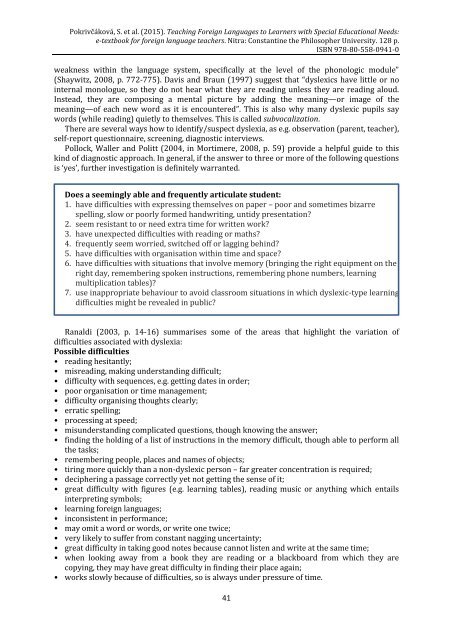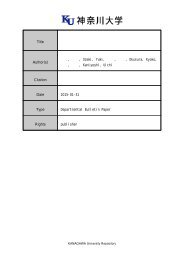to Learners with Special Educational Needs
e-textbook SEN
e-textbook SEN
Create successful ePaper yourself
Turn your PDF publications into a flip-book with our unique Google optimized e-Paper software.
Pokrivčáková, S. et al. (2015). Teaching Foreign Languages <strong>to</strong> <strong>Learners</strong> <strong>with</strong> <strong>Special</strong> <strong>Educational</strong> <strong>Needs</strong>:<br />
e-textbook for foreign language teachers. Nitra: Constantine the Philosopher University. 128 p.<br />
ISBN 978-80-558-0941-0<br />
weakness <strong>with</strong>in the language system, specifically at the level of the phonologic module”<br />
(Shaywitz, 2008, p. 772-775). Davis and Braun (1997) suggest that “dyslexics have little or no<br />
internal monologue, so they do not hear what they are reading unless they are reading aloud.<br />
Instead, they are composing a mental picture by adding the meaning—or image of the<br />
meaning—of each new word as it is encountered”. This is also why many dyslexic pupils say<br />
words (while reading) quietly <strong>to</strong> themselves. This is called subvocalization.<br />
There are several ways how <strong>to</strong> identify/suspect dyslexia, as e.g. observation (parent, teacher),<br />
self-report questionnaire, screening, diagnostic interviews.<br />
Pollock, Waller and Politt (2004, in Mortimere, 2008, p. 59) provide a helpful guide <strong>to</strong> this<br />
kind of diagnostic approach. In general, if the answer <strong>to</strong> three or more of the following questions<br />
is ‘yes’, further investigation is definitely warranted.<br />
Does a seemingly able and frequently articulate student:<br />
1. have difficulties <strong>with</strong> expressing themselves on paper – poor and sometimes bizarre<br />
spelling, slow or poorly formed handwriting, untidy presentation?<br />
2. seem resistant <strong>to</strong> or need extra time for written work?<br />
3. have unexpected difficulties <strong>with</strong> reading or maths?<br />
4. frequently seem worried, switched off or lagging behind?<br />
5. have difficulties <strong>with</strong> organisation <strong>with</strong>in time and space?<br />
6. have difficulties <strong>with</strong> situations that involve memory (bringing the right equipment on the<br />
right day, remembering spoken instructions, remembering phone numbers, learning<br />
multiplication tables)?<br />
7. use inappropriate behaviour <strong>to</strong> avoid classroom situations in which dyslexic-type learning<br />
difficulties might be revealed in public?<br />
Ranaldi (2003, p. 14-16) summarises some of the areas that highlight the variation of<br />
difficulties associated <strong>with</strong> dyslexia:<br />
Possible difficulties<br />
• reading hesitantly;<br />
• misreading, making understanding difficult;<br />
• difficulty <strong>with</strong> sequences, e.g. getting dates in order;<br />
• poor organisation or time management;<br />
• difficulty organising thoughts clearly;<br />
• erratic spelling;<br />
• processing at speed;<br />
• misunderstanding complicated questions, though knowing the answer;<br />
• finding the holding of a list of instructions in the memory difficult, though able <strong>to</strong> perform all<br />
the tasks;<br />
• remembering people, places and names of objects;<br />
• tiring more quickly than a non-dyslexic person – far greater concentration is required;<br />
• deciphering a passage correctly yet not getting the sense of it;<br />
• great difficulty <strong>with</strong> figures (e.g. learning tables), reading music or anything which entails<br />
interpreting symbols;<br />
• learning foreign languages;<br />
• inconsistent in performance;<br />
• may omit a word or words, or write one twice;<br />
• very likely <strong>to</strong> suffer from constant nagging uncertainty;<br />
• great difficulty in taking good notes because cannot listen and write at the same time;<br />
• when looking away from a book they are reading or a blackboard from which they are<br />
copying, they may have great difficulty in finding their place again;<br />
• works slowly because of difficulties, so is always under pressure of time.<br />
41






